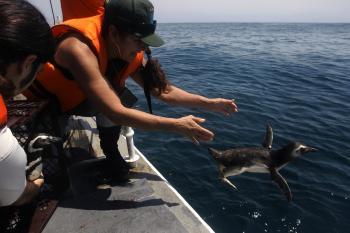RIO DE JANEIRO—Bribes paid to public officials in exchange for business advantages usually result in shoddy roads, crumbling bridges, substandard hospitals and schools, and food and drugs that don’t meet safety standards—they also represent losses of a trillion dollars per year, says the Organization for Economic Co-operation and Development (OECD).
International enforcement to curb this bribing, however, is still greatly lagging due to lack of political will says Transparency International (TI) in its 2010 Progress Report on the OECD Anti-bribery Convention released Wednesday in Berlin.
“The World Bank estimates that more than $1 trillion in bribes are paid each year out of a world economy of $30 trillion. That’s a staggering 3 percent of the world’s economy. And the impact is particularly severe on foreign investment,” U.S. Attorney General Eric H. Holder told the OECD on May 31.
TI assessed 36 signatories to the Anti-bribery Convention in its report. The number of parties actively enforcing the Convention grew from four in 2009—the United States, Norway, Switzerland, and Germany—to seven this year with the addition of Denmark, Italy, and the United Kingdom. Since these countries represent approximately 30 percent of world exports, this was considered a very positive development by the NGO.
Nine countries, representing 21 percent of the world exports, presented “moderate anti-bribery enforcement,” according to TI. However, TI found that 21 countries had “little or no enforcement.” Those countries represent 15 percent of the exports, and include Brazil, Australia, and the Canada.
“With active enforcement in only 7 of the 38 parties to the Convention, the Convention’s goal of effectively curbing foreign bribery in international business transactions is still far from being achieved,” said the report.
In Brazil, for example, the shortcomings included the lack of laws to prosecute companies that take part in corruption schemes, inadequate penalties, and a lack of legal resources to punish the headquarters of corrupt corporations in their countries of origin.
The Brazilian government, however, disagreed with its ranking by TI.
“The inclusion of Brazil in the group of countries that “present little or no enforcement” to the rules of OECD is ridiculous, does not have correspondence with the reality nor corresponds to OECD’s own evaluation,” said Minister of State, Head of the Office of the. Comptroller General of Brazil Jorge Hage.
“From the 16 recommendations that had been made to the country, 8 were considered fully met and 4 partially met. Only four recommendations were considered by the OECD as not yet met,” said Hage.
Among the deficiencies, Hage said only one was prominent, the adoption of a laws to make companies liability for corruption committed overseas against foreign public officials.
One problem highlighted by TI in its report is the fact that while one-third of exports come from countries with growing economies like India, Russia, and China they do not yet adhere to the Anti-bribery Convention. IT urged OECD to expedite its efforts toward including additional governments in the convention.
“Danger signals include efforts in some countries to limit the role of investigative magistrates, shorten statutes of limitations, and extend immunities from prosecution. The risk of backsliding is particularly acute during a time of recession, when competition for limited orders is intense,” the report concludes.
International enforcement to curb this bribing, however, is still greatly lagging due to lack of political will says Transparency International (TI) in its 2010 Progress Report on the OECD Anti-bribery Convention released Wednesday in Berlin.
“The World Bank estimates that more than $1 trillion in bribes are paid each year out of a world economy of $30 trillion. That’s a staggering 3 percent of the world’s economy. And the impact is particularly severe on foreign investment,” U.S. Attorney General Eric H. Holder told the OECD on May 31.
TI assessed 36 signatories to the Anti-bribery Convention in its report. The number of parties actively enforcing the Convention grew from four in 2009—the United States, Norway, Switzerland, and Germany—to seven this year with the addition of Denmark, Italy, and the United Kingdom. Since these countries represent approximately 30 percent of world exports, this was considered a very positive development by the NGO.
Nine countries, representing 21 percent of the world exports, presented “moderate anti-bribery enforcement,” according to TI. However, TI found that 21 countries had “little or no enforcement.” Those countries represent 15 percent of the exports, and include Brazil, Australia, and the Canada.
“With active enforcement in only 7 of the 38 parties to the Convention, the Convention’s goal of effectively curbing foreign bribery in international business transactions is still far from being achieved,” said the report.
In Brazil, for example, the shortcomings included the lack of laws to prosecute companies that take part in corruption schemes, inadequate penalties, and a lack of legal resources to punish the headquarters of corrupt corporations in their countries of origin.
The Brazilian government, however, disagreed with its ranking by TI.
“The inclusion of Brazil in the group of countries that “present little or no enforcement” to the rules of OECD is ridiculous, does not have correspondence with the reality nor corresponds to OECD’s own evaluation,” said Minister of State, Head of the Office of the. Comptroller General of Brazil Jorge Hage.
“From the 16 recommendations that had been made to the country, 8 were considered fully met and 4 partially met. Only four recommendations were considered by the OECD as not yet met,” said Hage.
Among the deficiencies, Hage said only one was prominent, the adoption of a laws to make companies liability for corruption committed overseas against foreign public officials.
One problem highlighted by TI in its report is the fact that while one-third of exports come from countries with growing economies like India, Russia, and China they do not yet adhere to the Anti-bribery Convention. IT urged OECD to expedite its efforts toward including additional governments in the convention.
“Danger signals include efforts in some countries to limit the role of investigative magistrates, shorten statutes of limitations, and extend immunities from prosecution. The risk of backsliding is particularly acute during a time of recession, when competition for limited orders is intense,” the report concludes.


